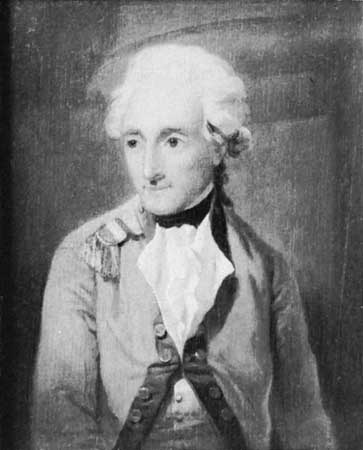Grattan, Henry
Anglo-Irish statesman
born July 3, 1746, Dublin
died June 6, 1820, London
 leader of the movement that forced Great Britain to grant legislative independence to Ireland in 1782. Later he headed opposition to the union (1800) of England and Ireland.
leader of the movement that forced Great Britain to grant legislative independence to Ireland in 1782. Later he headed opposition to the union (1800) of England and Ireland.A member of the ruling Anglo-Irish Protestant class, Grattan became a barrister and in the early 1770s joined Henry Flood's (Flood, Henry) campaign for national independence. He entered the Irish Parliament in December 1775, soon after Flood had forfeited the movement's leadership by accepting government office. Grattan's brilliant oratory soon made him the leading spokesman of the nationalist agitation. His movement gained momentum as more and more Irishmen came to sympathize with the North American colonists in their war for independence from Great Britain. By 1779 he was powerful enough to force the British government to remove most of its restraints on Irish trade, and in April 1780 he formally demanded the repeal of Poynings' Law, which had made all legislation passed by the Irish Parliament subject to approval by the English Parliament. Two years later the British—again in response to Grattan's demands and to pressure from the Irish Volunteers, a militia organized to defend Ireland against possible French invasion—relinquished their right to legislate for Ireland and freed the Irish Parliament from subservience to the English Privy Council. Despite these successes, Grattan soon faced rivalry from Flood, who bitterly criticized Grattan for failing to demand that the English Parliament completely renounce all claims to control of Irish legislation. Flood succeeded in undermining Grattan's popularity, but by 1784 Flood himself had lost much of his following.
From 1782 to 1797 Grattan made limited progress in his struggle to reform the composition of the Irish Parliament and to win voting rights for Ireland's Roman Catholics. The outbreak of the French Revolution (1789) bolstered his cause by infusing democratic ideas into Ireland, but the subsequent growth of a radical Irish movement for Catholic emancipation provoked repressive measures by England. Grattan was caught between the two sides. Ill and discouraged, he retired from Parliament in May 1797 and was in England when the Irish radicals staged an unsuccessful rebellion (1798). He returned to Parliament for five months in 1800 and waged a vigorous but fruitless campaign against Prime Minister William Pitt's plans for the legislative union of the Irish and English parliaments. In 1805 Grattan was elected to the English House of Commons, where for the last 15 years of his life he fought for Catholic emancipation.
- Youmans, Vincent
- Young
- Young America Movement
- Young, Andrew
- Young, Art
- Young, Arthur
- Young, Brigham
- Young, Charles Augustus
- Young, Chic
- Young Christian Workers
- Young, Coleman
- Young, Cy
- Young, Edward
- Young, Ella Flagg
- Younger Brothers
- Young, Francis Brett
- Young Germany
- Younghusband, Sir Francis Edward
- Young Ireland
- Young Italy
- Young, John W.
- Young, Lester
- Young, Loretta
- Young Maori Party
- Young, Marguerite